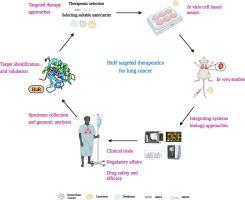Advanced Drug Delivery Reviews ( IF 15.2 ) Pub Date : 2021-11-22 , DOI: 10.1016/j.addr.2021.114068 Rajeswari Raguraman 1 , Santny Shanmugarama 2 , Meghna Mehta 3 , Jo Elle Peterson 4 , Yan D Zhao 5 , Anupama Munshi 3 , Rajagopal Ramesh 6

|
Lung cancer (LC) is often diagnosed at an advanced stage and conventional treatments for disease management have limitations associated with them. Novel therapeutic targets are thus avidly sought for the effective management of LC. RNA binding proteins (RBPs) have been convincingly established as key players in tumorigenesis, and their dysregulation is linked to multiple cancers, including LC. In this context, we review the role of Human antigen R (HuR), an RBP that is overexpressed in LC, and further associated with various aspects of LC tumor growth and response to therapy. Herein, we describe the role of HuR in LC progression and outline the evidences supporting various pharmacologic and biologic approaches for inhibiting HuR expression and function. These approaches, including use of small molecule inhibitors, siRNAs and shRNAs, have demonstrated favorable results in reducing tumor cell growth, invasion and migration, angiogenesis and metastasis. Hence, HuR has significant potential as a key therapeutic target in LC. Use of siRNA-based approaches, however, have certain limitations that prevent their maximal exploitation as cancer therapies. To address this, in the conclusion of this review, we provide a list of nanomedicine-based HuR targeting approaches currently being employed for siRNA and shRNA delivery, and provide a rationale for the immense potential therapeutic benefits offered by nanocarrier-based HuR targeting and its promise for treating patients with LC.
中文翻译:

HuR 靶向治疗肺癌的药物输送方法
肺癌(LC)通常在晚期才被诊断出来,疾病管理的常规治疗方法具有与之相关的局限性。因此,人们迫切地寻求新的治疗靶点来有效管理 LC。RNA 结合蛋白 (RBP) 已被确定为肿瘤发生的关键因素,其失调与包括 LC 在内的多种癌症有关。在此背景下,我们回顾了人类抗原 R (HuR) 的作用,这是一种在 LC 中过度表达的 RBP,并进一步与 LC 肿瘤生长和治疗反应的各个方面相关。在此,我们描述了 HuR 在 LC 进展中的作用,并概述了支持抑制 HuR 表达和功能的各种药理学和生物学方法的证据。这些方法,包括使用小分子抑制剂、siRNA 和 shRNA,已证明在减少肿瘤细胞生长、侵袭和迁移、血管生成和转移方面具有良好的效果。因此,HuR 具有作为 LC 关键治疗靶点的巨大潜力。然而,基于 siRNA 的方法的使用有一定的局限性,阻碍了它们作为癌症疗法的最大利用。为了解决这个问题,在本次综述的结论中,我们提供了目前用于 siRNA 和 shRNA 递送的基于纳米医学的 HuR 靶向方法的列表,并为基于纳米载体的 HuR 靶向及其所提供的巨大潜在治疗益处提供了基本原理。治疗 LC 患者的承诺。









































 京公网安备 11010802027423号
京公网安备 11010802027423号